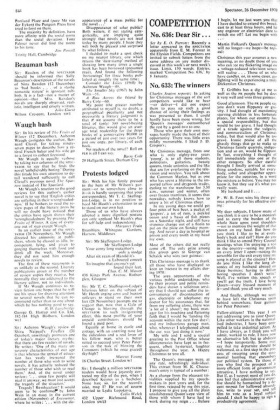Waugh bash
Sir: In his review of The Fruits of Winter (12 December), Auberon Waugh castigates the author. Ber- nard Clavel, for taking ninety- seven pages to describe how a re- tired French baker and his wife go to a forest to collect firewood.
Mr Waugh is equally verbose by taking two columns of the SPEC- TATOR to say that he finds the novel 'unbelievably boring.' During this tirade his own attention to de- tail wandered sufficiently to call Clavel's previous novel The Spar- row instead of The Spaniard.
Mr Waugh's reaction to the good reviews for this author's earlier novel is to say that 'English critics are unfailing in their wrongheaded- ness.' If he bothers to read the re- view pages of the literary press he will no doubt have noticed that the critics have again shown their 'wrongheadedness' by praising The Fruits of Winter. A case of every- one out of step except Waugh.
In an earlier issue of the SPEC- TATOR (28 November). Mr Waugh directed his animosity at publi- shers. whom he classed as idle. in- competent, lying, and given to gorging themselves with food and drink all the week. Moreover. they did not send him enough novels to review.
The first of these statements is as unlikely as the second. Literary publications groan at the number of review copies they receive, but normally they are addressed to the literary editor, not to individuals.
If Mr Waugh continues to re- view fiction one hopes that he will use his space for drawing attention to several novels that he can re- commend rather than to one about which he has nothing good to say.
R. H. Langbridge George G. Harrap and Co. Ltd, 182-184 High Holborn, London wcl Sir: Auberon Waugh's review of Shiva Naipaul's Fireflies (31 October). unwittingly promotes one of today's major literars myths: that there are few readers of novels. He writes: 'One of the many un- savoury characteristics of our age is that whereas the spread of educa- tion has vastly increased the number of those who wish to write novels, it has actually reduced the number of those who wish to read them.' And, of the novel under review: '. . . since few people will read it anyway, we must just accept the tragedy of the situation.'
Tragedy? Re-education? It would seem to be confirmed° by John Wain in an essay in the current edition (November) of Encounter. where he writes: '.. . with the dis- appearance of a mass public for the novel ...'
Disappearance of what public? Both writers, if not stating cate- gorically, are implying quite strongly that novels are not read today by many people. I hope they will both be pleased and surprised by what follows.
I decided to make a spot check on my nearest library, one which retains the 'date-stamp' method of showing how many times a single book has been borrowed (presumed read). And found the following 'borrowings' for three books pub- lished at roughly the same time: Consider the Lilies (1968) by Auberon Waugh-49.
The Smaller Sky (1967) by John Wain —51.
A Run Across the Island by Barry Cole-60.
My point (the greater number attributed to myself is. no doubt, a geographical peculiarity and not necessarily a literary judgment) is that if we assume there to be a total of (only) 500 novel-buying libraries, this would give an aver- age total readership for the three books of a conservative 80.000 in a period of just over two years for just one copy, per library, of each book.
No readers of the novel? Roll on PLR is all I can say.
Barry Cole 29 Hallgarth Street, Durham City


















































 Previous page
Previous page